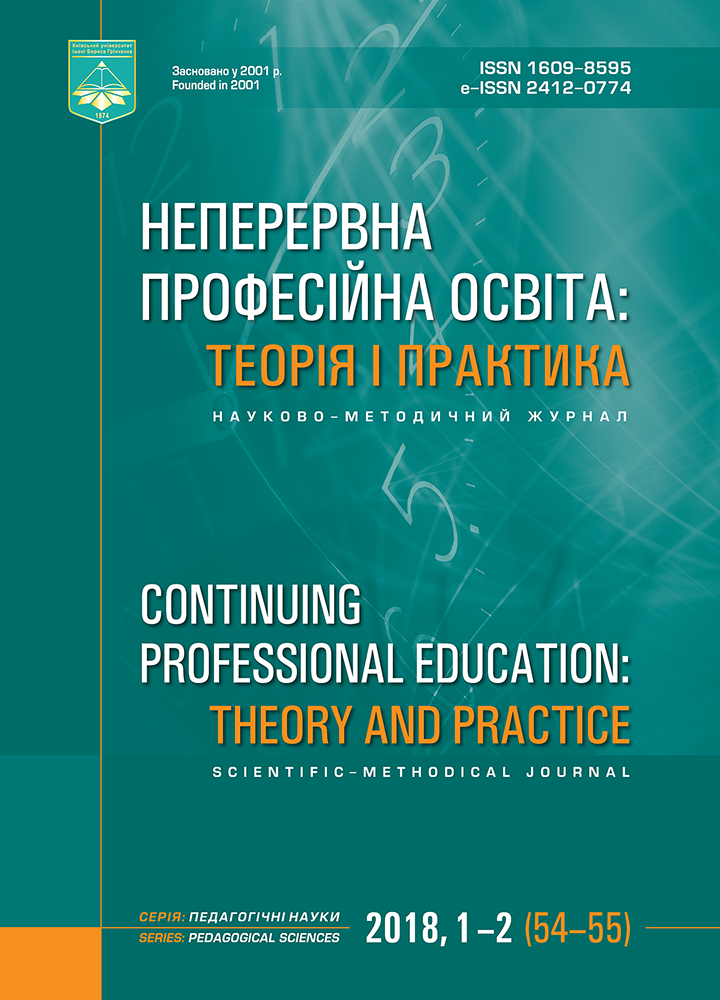AXIOLOGICAL BASIS OF THE FUTURE TEACHER’S CIVIC COMPETENCE DEVELOPMENT
DOI:
https://doi.org/10.28925/1609-8595.2018(1-2)1521Keywords:
civic competence of the future pedagogue, educational process, subject of study, universal, national and European values, value.Abstract
The article deals with the axiological basis of civic competence of future pedagogues. These are three groups of values: universal, national and European. The definition and structure of the concept of «value» are analyzed. It is established that values are determined by the vector of human, social and state development, forming the image of the desired future. It is determined that development of the personality of the future pedagogue and formation of his civic competence should be carried out on the basis of human, national and European values. Specified on the necessity of developing the requirements for the organization and implementation of the educational process is based on the values of beauty, goodness, truth, justice, family, natural human rights, democracy, rule of law, patriotism, national culture, national sovereignty and national security. It has been established that the formation of values in the younger generation is a key problem of the educational policy of the leading countries of the world. This problem can be fixed in the process of pedagogical action, the subjects of which are the pedagogue, as a specialist who teaches, educates, develops, leads behind him and student as a person which tries through its own emotional sphere perceive and comprehend the information that is offered to him in order to further its use in own life for the development of personal and professional qualities that will help him to be successful in the modern world.References
Amelchenko, N. (2013). Tsinnosti obiednanoi Yevropy [Values of the united Europe]. Kiyv, Ukraine: HO «Laboratoriia zakonodavchykh initsiatyv» (ukr).
Vyshnevskyi, O. (2008). Teoretychni osnovy suchasnoi ukrainskoi pedahohiky: navchalny posibnyk [Theoretical foundations of modern Ukrainian pedagogy]. Kiyv, Ukraine: Znannia, 230–234 (ukr).
Hai-Nyzhnyk, P. P. (2014). Natsionalni interesy, natsionalni tsinnosti ta natsionalni tsili yak strukturo formuiuchi chynnyky polityky natsionalnoi bezpeky [National interests, national values and national goals as structural factors of national security policy]. Hileia: naukovyi visnyk, 84, 465–471 (ukr).
Horbulin,V. P., Kachynskyi, A. B. (2009). Zasady natsionalnoi bezpeky Ukrainy [The basis of national security of Ukraine]. Kiyv, Ukraine: Intertekhnolohiia (ukr).
Horbulin, V. P., Kachynskyi, A. B. (2005). Stratehiia natsionalnoi bezpeky Ukrainy v aksiolohichnomu vymiri: vid «suspilstva ryzyku» do hromadianskoho suspilstva [The strategy of national security of Ukraine in axiological terms: from «society of risk» to civil society]. Stratehichna panorama, 2, 13–27 (ukr).
Dolzhenko, V. O. (2006). Vykhovannia dukhovnykh tsinnostei u studentskoi molodi v polikulturnomu prostori [Education of spiritual values in student’s youth in a multicultural space]. Extended abstract of candidate’s thesis: 13.00.07. Luhansk, Ukraine (ukr).
Yevropeiska konventsiia z prav liudyny ta osnovopolozhnykh svobod liudyny [European Convention on Human Rights and Fundamental Freedoms]. Retrieved from http://zakon3.rada.gov.ua/laws/show/995_004 (ukr).
Yevropeiska sotsialna khartiia [European Social Charter]. Retrieved from http://zakon3.rada.gov.ua/laws/show/994_062 (ukr).
Yevropeiska Khartiia rehionalnykh mov abo mov menshyn [European Charter for Regional or Minority Languages]. Retrieved from http://zakon3.rada.gov.ua/laws/show/994_014 (ukr).
Yevtodiuk, A. V. (2014). Aksiolohichni zasady suchasnoi systemy osvity Ukrainy [Axiological foundations of the modern system of education of Ukraine]. Pedahohichnyi poshuk, 2, 12–15.
Ihnatenko, P. R. (1997). Aksiolohiia vykhovannia: vid terminolohii do postanovky problem [Axiology of education: from terminology to problem statement]. Pedahohika i psykholohiia, 1, 118–124 (ukr).
Nosenko, E. L. (1999). Transformacija cennostnyh orientacij molodezhi na sovremennom etape rozvitija obshhestva (Psihologicheskij aspekt) [Transformation of value orientations of youth at the present stage of development of society (Psychological aspect)]. Dnepropetrovsk, Ukraine: Navchalna knyha (rus).
Parakhonskyi, B. O. (1993). Natsionalni interesy Ukrainy (dukhovno–intelektualnyi aspekt) [National interests of Ukraine (spiritual and intellectual aspect)]. Kiyv, Ukraine: NISD (ukr).
Piddjachyj, M. I. (2016). Osvita i nauka Ukrajiny u vymiri ghromadjansjkykh suspiljstv: socialjno-profesijna orijentacija [Education and science of Ukraine in the dimension of civil society: social and professional orientation]. Neperervna profesiina osvita: teoriia i praktyka, 3–4 (48–49), 59–65 (ukr).
Radchenko, Ya. Yu., Radchenko, L. A., Hasanova, A. Э., Bylenko, L. M., Pohorelova, A. A. (2017). Ocenka vzaimodejstvija ponjatija «znanie» i sovremennyh mirovyh problem pitanija cheloveka [Evaluation of the interaction of the concept of «knowledge» and modern world problems of human nutrition]. ScienceRise, 5, 74. doi.: https://doi.org/10.15587/2313-8416.2017.102071 (rus).
Ramkova konventsiia pro zakhyst natsionalnykh menshyn [Framework Convention for the Protection of National Minorities]. Retrieved from http://zakon3.rada.gov.ua/laws/show/995_055 (ukr).
Khartiia osnovnykh prav Yevropeiskoho Soiuzu [Charter of Fundamental Rights of the European Union]. Retrieved from http://zakon3.rada.gov.ua/laws/show/994_524 (ukr).
Khomych, L. O. Naskrizni tsinnosti u zmisti navchannia i vykhovannia maibutnikh pedahohiv [Transverse values in the content of education and upbringing of future teachers]. Retrieved from http://lib.iitta.gov.ua/5765/ (ukr).
Downloads
How to Cite
Issue
Section
License
Copyright (c) 2020 Volodymyr Piddyachiy

This work is licensed under a Creative Commons Attribution-NonCommercial 3.0 Unported License.



